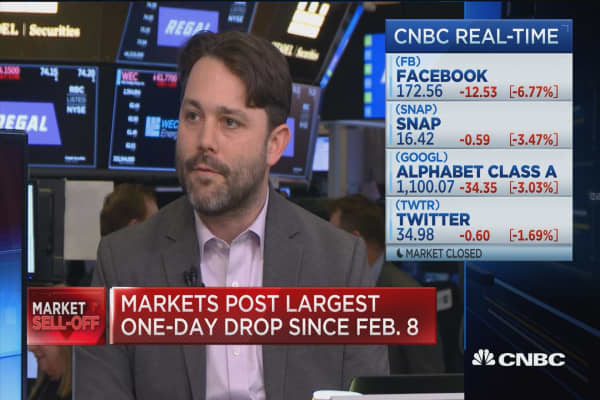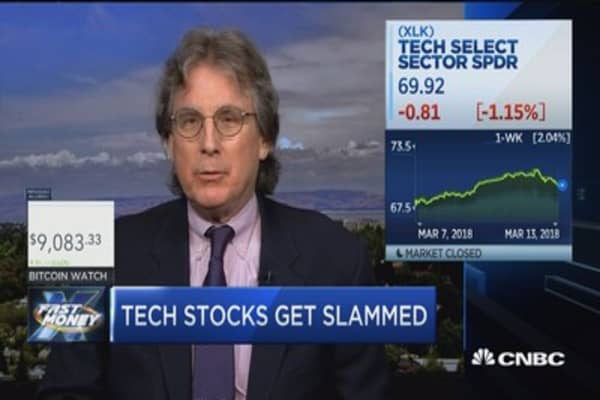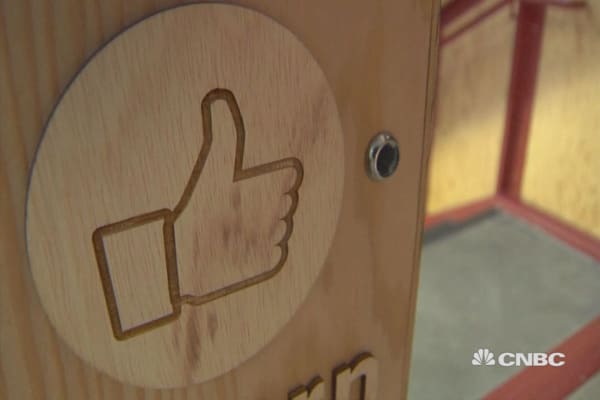Facebook is facing its biggest test ever—and its lack of leadership could sink the company
- Facebook’s reaction to a year of scandal has vacillated between defensive cluelessness and aloof silence.
- Users are getting the message that information they post on Facebook can be used in ways they did not intend, and usage is starting to decline.
- Meanwhile, executives are selling shares like crazy, including a plan by Mark Zuckerberg to sell almost $13 billion worth of shares by mid-2019.
Matt Rosoff
CNBC
Facebook breach has caused people to wake up, says tech expert
Facebook is facing an existential test, and its leadership is failing to address it.
Good leaders admit mistakes, apologize quickly, show up where they’re needed and show their belief in the company by keeping skin in the game.
Facebook executives, in contrast, react to negative news with spin and attempts to bury it. Throughout the last year, every time bad news has broken, executives have downplayed its significance. Look at its public statements last year about how many people had seen Russian-bought election ads — first it was 10 million, then it was 126 million.
Top execs dodged Congress when it was asking questions about Russian interference. They are selling their shares at a record clip.
The actions of Facebook execs now recall how execs at Nokia and Blackberry reacted after the iPhone emerged. Their revenues kept growing for a couple years — and they dismissed the threats. By the time users started leaving in droves, it was too late.
There’s no outside attacker bringing Facebook down. It’s a circular firing squad that stems from the company’s fundamental business model of collecting data from users, and using that data to sell targeted ads. For years, users went along with the bargain. But after almost a year of constant negative publicity, their patience may be waning.
Facebook did not initially respond to questions or a request for comment from CNBC.
The drumbeat
For more than a year now, Facebook has been deflecting stories about how its platform was used during the 2016 presidential election.
Some of this activity — like Facebook embedding workers with the Trump campaign to tell them how to advertise more effectively — was perfectly legal, and in line with normal business practices. A lot of these tactics would probably have drawn no scrutiny if Donald Trump hadn’t surprised everybody by winning an election that all the polls showed him losing.
Other activity was against Facebook’s policies, or outright illegal. Most notably, a U.S. grand jury recently indicted 13 Russian nationals for conducting a disinformation campaign on American soil intended to further political divisions in the country and sway the election toward Trump. Their tactics included using Facebook groups to organize divisive political protests and buying targeted ads.
CEO and founder Mark Zuckerberg has remained aloof throughout the whole sequence of events.
He addresses some of these issues on personal Facebook posts, but seldom talks to the press about them. Last year, he spent most of the year doing photo ops with people around America, but did not show up when Congress asked questions about how the Russians used Facebook to influence the 2016 election.
This year, he announced his annual personal challenge would be fixing Facebook — in other words, doing his job as the CEO of a publicly traded company worth more than $500 billion. In past years, he’s taught himself Mandarin and hunted his own food.
The spin
Over the weekend, Facebook gave a case study in how the company reacts inappropriately to negative news.
On Friday night, Facebook made a surprise announcement that the company had suspended a political analytics research firm, Cambridge Analytica. The firm was funded by large Republican donor Robert Mercer, and Trump’s campaign used it to target ads on Facebook.
In its Friday post, Facebook claimed it had discovered new evidence that Cambridge Analytica had not deleted data about Facebook users passed to it by a Russian-American researcher, who had collected it through a personality quiz that 270,000 Facebook users took. The data included information like the cities where users lived and what they had “liked” on Facebook.
It was against Facebook’s terms of use for the researcher to pass the data along. Cambridge Analytica had told Facebook it had deleted the data back in 2015, but Facebook said it had received recent reports to the contrary, according to the blog post.
(Cambridge Analytica has countered the allegations, saying it was in compliance with Facebook’s guidelines, and that no data collected through the app was used in the Trump campaign.)
Facebook’s brand more damaged than the stock, says ex-Zuckerberg mentor
But as is often the case in political scandal, the problem isn’t so much the original action, but the cover-up. Or in this case, the spin.
It turns out that Facebook didn’t just spontaneously decide to ban the political research firm. It was actually trying to get ahead of two bombshell reports, in the New York Times and The Observer (the Sunday edition of U.K. paper The Guardian). The publications detailed exactly how Cambridge Analytica had collected information about Facebook users in a bid to target them with political messages.
Facebook knew about these news stories for some time. It also appears that the company was trying to squelch the reports.
The Times report claimed that, in private conversations with the newspaper, Facebook “downplayed the scope of the leak and questioned whether any of the data still remained out of its control.” The Guardian wrote that “Facebook’s external lawyers warned the Observer it was making ‘false and defamatory’ allegations, and reserved Facebook’s legal position.”
The stories went ahead anyway. Once they were published, Facebook executives immediately took to Twitter to defend the company, insisting that this was not a “breach.”
In tweets that were later deleted, Facebook chief security officer Alex Stamos called the stories “important and powerful,” while insisting that it was “incorrect to call it a ‘breach’ under any reasonable definition of the term.” The deleted tweets are preserved below:
http://twitter.com/aprilaser/status/975078309930311680?ref_src=twsrc%5Etfw&ref_url=http%3A%2F%2Fwww.cnbc.com%2F2018%2F03%2F18%2Ffacebook-failing-zuckerberg-and-sandberg-absent-commentary.html&tfw_creator=mattrosoff&tfw_site=CNBC
Another senior Facebook exec, Andrew Bosworth, echoed that claim, saying it was “unequivocally not a data breach.”
http://twitter.com/boztank/status/975018461997887494?ref_src=twsrc%5Etfw&ref_url=http%3A%2F%2Fwww.cnbc.com%2F2018%2F03%2F18%2Ffacebook-failing-zuckerberg-and-sandberg-absent-commentary.html&tfw_creator=mattrosoff&tfw_site=CNBC
So far, more than 24 hours after the stories, Zuckerberg and his number-two, COO Sheryl Sandberg, have not responded.
Missing the point
The Facebook executives who responded are correct — there was no security breach. Users gave their information willingly. Moreover, Facebook has since put better security controls for apps in place, so users can more easily control what information apps are gathering and how they’re using it.
But they’re missing the point.
Facebook users are slowly learning that almost anybody can use Facebook to collect detailed information about them, and that — at least some of the time — Facebook cannot control where this information flows, or how it is used. Using Facebook is like writing your life story down on a piece of paper, then taping it to a lamppost.
Journalists and privacy advocates may roll their eyes at this “revelation” — they’ve been warning people about Facebook and privacy since its inception.
Users mostly ignored these warnings. They wanted to share photos, connect with old friends, play games, take quizzes and watch videos, and Facebook gave them a simple way to do it. More than 2 billion people around the world now use the 14-year-old service, and Facebook sold nearly $40 billion worth of ads last year.
But things are beginning to change. There’s a growing sense that Facebook has become creepy instead of fun.
Facebook is losing younger users to Snapchat, according to a study
A lot of people are noticing that the ads on Facebook and Facebook-owned Instagram are so precisely targeted, they’re sure the company is eavesdropping on their conversations through their phone microphones. (Facebook swears it is not — CNBC’s Michelle Castillo has a great explanation of what is probably going on.)
More to the point, people are starting to curb their Facebook usage. In the fourth quarter, for the first time ever, the number of people in North America who used Facebook every day dropped from the previous year.
Also, Zuckerberg told investors on the company’s earnings call that the company saw a 5 percent drop in time spent on Facebook during the quarter. The company claimed that this reduced engagement was because of some technical changes that Facebook made to crack down on low-quality content and give users a more positive experience.
These are just two small metrics. Facebook is still growing in many regions and by many other measurements.
Mark Zuckerberg: Facebook changes reduced time spent on site by 50 million hours a day in Q4
But still: Fewer people using Facebook every day in one region, and spending less time on it. That’s never happened before.
For the time being, advertisers are grumbling about Facebook and warning their clients to stay away from certain ad products, but they’re still putting their money there — with an audience over 2 billion and some of the most accurate ad targeting available, Facebook is still impossible to ignore.
But if usage continues to decline, advertisers will start eventually follow. And there are plenty of hungry smaller competitors — Twitterand Snap, particularly — who would be happy to take some of that money.
Executive stock sales not reassuring
Meanwhile, Facebook executives are not exactly sending a reassuring message to investors by unloading their shares at a rapid clip.
Last summer, after Zuckerberg’s plan to create another class of stock to solidify his control of the company foundered, he announced he’d begin selling off up to 75 million shares (about 18 percent of his stake), worth nearly $13 billion, by mid-2019. The money will support the Chan Zuckerberg Initiative (CZI), his other company devoted to good works.
Those sales are well underway. In February he sold nearly $500 million worth of shares, and he’s on pace to sell that much or more in March. By way of comparison, he sold only about $1.6 billion worth to fund CZI over the last two years.
Why now? Zuckerberg is 33 years old — far from retirement. What exactly is CZI doing that requires such a massive investment? Amazon CEO Jeff Bezos is building rocket ships to explore space with his other company Blue Origin, and he only needs to spend $1 billion a year.
Other top executives are also selling in massive amounts. Jan Koum, who founded the messaging app WhatsApp, which Facebook bought in 2014 for $19 billion, sold $2.8 billion worth of shares last year — more than any exec at any major tech company. (Amazon CEO Jeff Bezos sold $2 billion of stock last year, in part to fund Blue Origin. Nobody else is close.)
Sandberg sold over $300 million, which pales in comparison to her colleagues but is still unusually large among officers of top tech companies.
Facebook stock is up over 80 percent in the last 12 months. Perhaps these execs are just taking gains, as any normal employee with stock compensation would be advised to do.
But these are not normal employees. They’re the leaders of the company.
Other leaders keep skin in the game during difficult times — think of how Microsoft CEO Steve Ballmer held on to most of his stock throughout his tenure, even as Microsoft faced expensive antitrust lawsuits and growing competitive threats, or how Twitter CEO Jack Dorsey bought shares in 2017 when many investors had written the company off.
Facebook is facing real problems. Instead of giving answers to those problems, top execs are selling, spinning and staying silent.
That’s not leadership. And when leaders fail to lead, companies fail.
___
http://www.cnbc.com/2018/03/18/facebook-failing-zuckerberg-and-sandberg-absent-commentary.html




